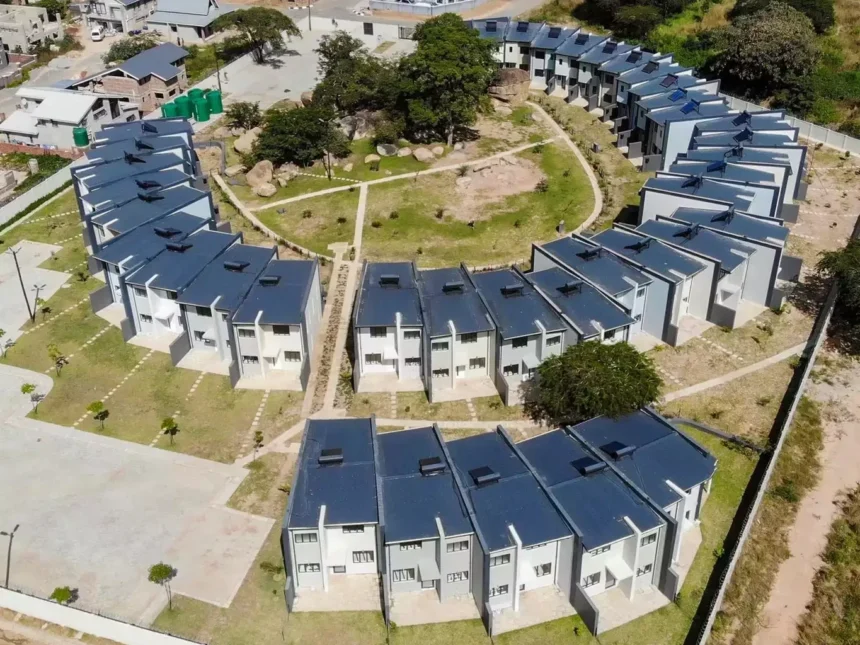By Correspondent
In 2023, over 2,500 cluster units were developed in Harare, but the absence of new service infrastructure threatens to turn them into ghetto hostels.
According to Property, “the average price of a cluster unit in Harare is $85,000–$150,000, compared to standalone houses, which start at $180,000 in prime locations”.
This has created a stampede for these units among the affluent people.
A Novel Approach To Housing
According to ZimProperty Insights, “73% of home buyers prioritise security when choosing a home.
“Gated communities offer 24/7 surveillance, perimeter walls, and controlled access, making them an attractive choice for middle- and high-income buyers”.
“Zimbabweans in the diaspora are a major force in the real estate market.
Property data shows that 40% of property searches originate from the diaspora, with the UK, South Africa, and USA leading.
“Cluster developments provide a manageable investment with the potential for rental yields of 6–9% per annum.
The impetus has been witnessed in the property development sector, where many companies have been building units across the city.
However, Harare City Council has not correspondingly improved the various ablution systems in the capital.
A Sea of Sewage
Speaking at a Pre-Budget Hearing, Ward 41 residents expressed anger at cluster projects coming up without new sewage lines.
“This area of Marlborough used to be affluent, but what we are now seeing with these cluster houses is disturbing.
“The sewage system that we had was for a specific number of people, but now it is operating under pressure.
“There are constant sewage bursts, and we are suffocating under the smell.
“Why is Council allowing these new clusters to be built with no improvements on infrastructure?” queried one resident.
The Rise of Activist Residents
The absence of infrastructure improvements has led some to take legal action.
In April, High Court Judge Justice Paul Musithu declared unlawful a cluster housing project in Greystone Park.
He ruled that the developer, Dashway Investments, had commenced construction without an Environmental Impact Assessment (EIA) certificate or Development Permit.
The High Court prohibited any further development at Stand 663, Greystone Park Township 8, citing breaches of planning regulations.
This followed objections by the Borrowdale Residents and Ratepayers Association (BRRA).
In another ongoing case, the BRRA has filed an urgent chamber application at the High Court to halt the construction of cluster flats at Number 949 Sugar Loaf Township, Glen Lorne.
The application was filed against businessman Leonard Mukumba, who is reportedly building three blocks of flats designed to house eight families each.
Trauma Centre Hospital has also approached the High Court to stop the building of an office park project in Borrowdale.
It alleges that it endangers public safety and patient well-being.
Widespread Opposition
The many cases highlight the widespread opposition to these projects due to the many problems which they are creating.
However, Truth Diggers, an Alpha Media Holdings investigative unit, has revealed that multiple petitions have been submitted to Harare City Council (HCC) challenging illegal cluster developments.
Complaining residents allege that Harare Council has turned a deaf ear, prompting fears of bias and backdoor deals.
“In one of the several petitions, residents of Inverary Road in Pomona submitted a written petition to HCC objecting to the construction of 7 duplex cluster units on Stand 104, citing a lack of legal notification and procedural irregularities.
“None of the neighbours received any formal communication.
“Hence our conclusion that the petition has been issued irregularly as this step appears to have been overlooked, ”reads the petition.
While limitations to the availability of land support the building of high-rise houses, it is the flagrant abandonment with which the initiative is being done which has angered many.
Council officials are on record stating that no specific land has been allocated for cluster housing development in the past 7 years.
This means the many projects coming up are being driven by private land deals and speculative approvals.
Most of these are clearly not in line with the council’s official housing policy.
This has laid the ground for multiple problems in the future when the supposed solution to housing turns out to be a huge problem in itself.



